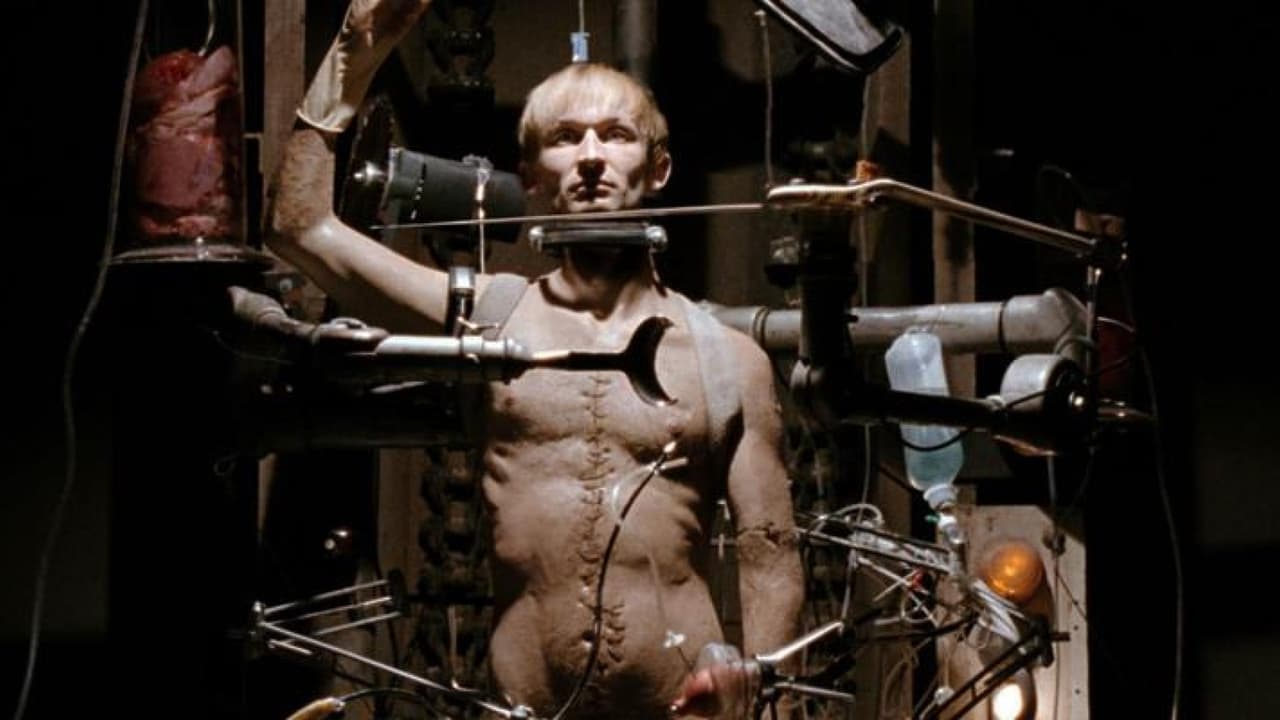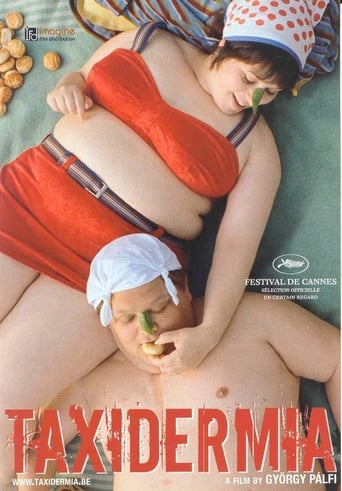



SERIOUSLY. This is what the crap Hollywood still puts out?
View MoreInstant Favorite.
Disappointment for a huge fan!
One of those movie experiences that is so good it makes you realize you've been grading everything else on a curve.
View MoreTaxidermia. Hungary 2006 Viewed at the 2006 Magyar film week. (filmszemle) New Hungarian features on view here range from the utterly ridiculous to the utterly sublime. At the ridiculous extreme is "TAXIDERMIA" by "Hukkle" director Pálfi György, while on the sublime side of the spectrum is the ethereally sensuous "The Bird Saviour, Clouds and Wind", by first time director István "Taikyo" Szaladják. "Taxidermia" doesn't have much to do with the art of taxidermy (although a taxidermist does make a brief appearance toward the end), but has everything to do with force feeding of fat people, voluminous streams of regurgitation, masochistic self-torture with candle flames, and graphically disgusting butchering of a pig. It seems that upcoming young director Pálfi is out to make an indelible impression on the local film scene by outdoing John Waters in shock effect, Bunuel in acid satire, and Peter Greenaway in sheer disgust. Missing from his film, however, is Waters' sense of humor, Bunuel's subtlety, and Greenaways erudition. The film starts out with a long dark sequence involving a sexually perverted soldier who revels in tickling the tenderest portions of his anatomy with candle flames when not engaged in other acts of sexual aberration with a constantly turgid purple penis. He is ordered about by a screaming, sadistic unteroffizier of some sort, which is perhaps meant to be a wry commentary on military discipline but comes off as a wry commentary on nothing. Fortunately this gruesome soldat is killed off with a quick bullet to the head some twenty minutes into the picture, whereupon we segue into the main part of the film -- a series of public gluttony competitions in which extremely obese people slop up messes of food from wooden trowels as fast as they can -- sloshing their faces in the mess as they go -- and then, with the help of assistants, vomit it all out as fast as they can, to get ready for another round of ravenous scarfing -- and then another round of puking ... and so forth. We focus on a particular extra fat couple who apparently are vying for the sloppiest scarfers in the world title, and they have a professional trainer to hone their skills. Somewhere in between there is a graphic hog vivisection where the hot steaming innards are pulled out in full camera close-up, and then the bloody butchered carcass is blackened over an outdoor fire. Perhaps this is meant to be a sardonic comment on the primitive ritual of Pig Killing (diszno ölés) traditional in many Hungarian villages at certain times of the year. On and on it goes -- more gluttony, more vomiting, and lots of blood and guts whenever possible. Personally I had gotten the basic message after the third or fourth stream of hot vomit --very realistically done, I must say, with none of the conventional gentility of ordinary films when a character gets sick to his stomach -- and considered hitting the exit several times long before the halfway mark, but for some reason, maybe just an excercise in patience and self discipline, I decided to stick it out until the bitter end, just to see how much vomit I could take without flinching -- and I did finally make it. If this was supposed to be a black comedy I did not hear a single chuckle the entire time, although oddly enough, there were no walkouts from the packed theater. A kind of mass hypnotism or something -- who can say? I was told later that some people actually liked the movie, or at least thought it was interesting. I guess even in Hungary "different strokes for different folks" is a valid bromide. I am most curious to see what kind of business this film will do in the commercial cinemas when and if it is released, or escapes. So much for the ridiculous. By the way, the music wasn't bad ... and, come to think of it, just for the cachet attached to the director's name and the blatant in-your-faceness of it all, "Taxidermia" may pack its way into some festivals -- especially the ones dedicated to horror and bad taste.
View MoreThis was a complete and utter waste of time. I have never seen a Hungarian film before, and "Taxidermia" sure didn't leave much of a great impression.This was bizarre and over the top, and seemed more like an exhibition of freakshow more than it was a movie. There was a lot of strange and bizarre things being shown in the movie, and a bit too much sexual contents in my opinion, which leads to viewer discretion.The story is about three extreme people, in each their own way. But neither of the stories told really had much worth or entertainment to it. And it seemed this was all about just getting as much weird stuff crammed into each story as possible.Everything in the movie is very graphic and visual, and there are many scenes that could prove too much some some viewers.I am sure that the people hired for the roles were doing good enough jobs. I just didn't care one bit for this movie, so I didn't really pay much attention to their performances.There was just too much avant-garde film-making in this movie for my liking. But I am sure there is an audience out there for it.
View MoreThis brilliantly twisted triptych of three generations of related men may well be like nothing you have ever seen.Beginning with a low-ranked officer situated in a rural farmhouse in WWII, who despite being regimented to his cause, struggles to keep his sexual fantasies at bay. When he one day has (seemingly imaginary) rampant sex with the Lieutenants wife on top of butchered swine, she later gives birth to a baby boy with a pigs tail. We then see the boy as a grown adult, an internationally renowned speed-eater no less, and thus the second story unfolds. Circumstances dictate, producing the birth of another baby boy, which in turn leads us into the final act. To give further narrative detail away would be harsh, as there is much amusement to be had here.Stylistically reminiscent of the work of Jean-Pierre Jeunet (particularly his collaborations with co-director, Marc Caro) and the recent output of Roy Andersson. Yet this is an altogether darker fare. Imagine a more gross-out version of the BBC's League of Gentlemen series. With the themes and messages seeming to highlight societies desire to consume and control (and indeed to control our own urges), this has more in tone with the more subversive offerings of Bunuel, or Pasolini's Salo even (particular in the middle segment).Frequently hilarious, often stomach churning, Hungarian director György Pálfi has given us a surrealistic pillow to put our heads down upon.Just don't expect to eat very much immediately afterwards.
View MoreTAXIDERMIA is exhaustively demented and disturbingly grotesque, however I can't recall when such unrelenting ugliness has been so transformed by the beauty of cinema. The director, György Pálfi, has done an almost miraculous job presenting the very essence of what is displeasing to the senses in the most achingly alluring and captivating manner. The film is divided into three sections which document incidents within the lives of three generations of men- a Grandfather, Father, and Son. And, I suppose that through the examination of these biographical sketches, the film addresses the much larger themes of Sex, Food, and Death. The first man's story concerns his military service as an aide to a cruel lieutenant while he was stationed in an isolated rural area. His commanding officer's nubile daughters become the object of his unrelenting and insatiable lust. "Sex" has never been presented in such an unappealing light. Next, in section two of the film, this man's son grows up to become a competitive eating champion for the greater glory of the soviet republics. Flabby titans chow-down in a race to consume the most unappetizing of foods. And, then they projectile vomit. "Food" has never been presented in such an unappealing light. I know that I have never witnessed anything quite this sickening in over forty years of watching films. And finally, the last chapter depicts the grandson as an urban taxidermist who takes care of his morbidly obese father, tends supernaturally large cats, and engineers his own death. This section of the film is probably the most surreal, and verges on the more avant-garde aspects of Dadaism. Once again, we are treated to the most unappealing insight into the depiction of "Death". And, then the film ends. Overall, you've just watched a madcap, full assault on middle class sensibilities and the boundaries of both good and bad taste. The early work of the filmmaker, John Waters, probably compares to TAXIDERMIA, but his work comes off as a trifle tired and threadbare compared to Gyorgy Palfi's lush and opulent ode to odiousness.
View More